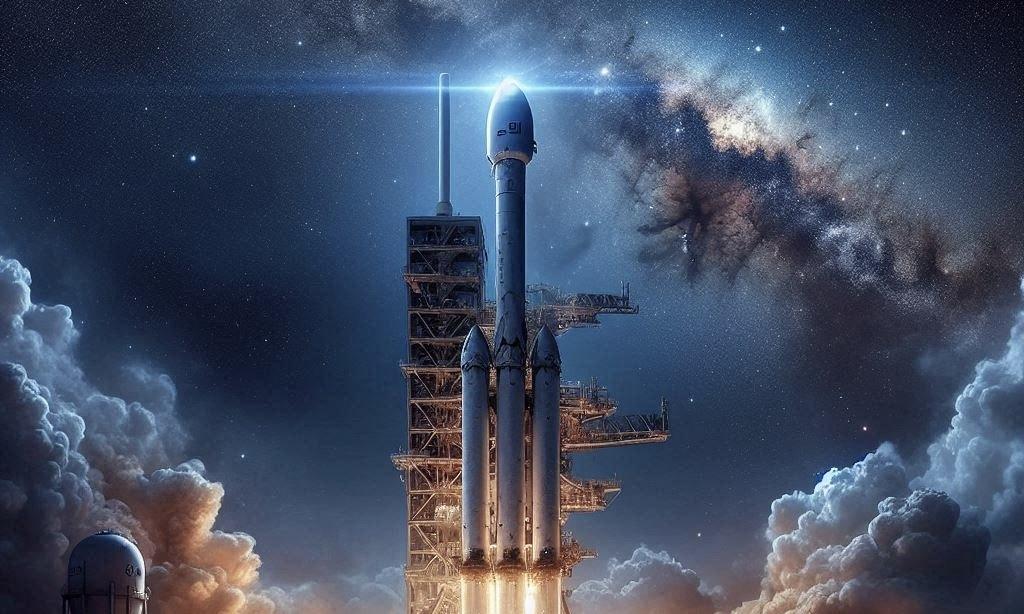SpaceX has suspended all Falcon 9 launches after an anomaly occurred with the rocket's second stage during the Crew 9 mission for NASA. The second stage failed to land as planned, prompting an investigation and delaying future launches, including the upcoming Europa Clipper mission.
SpaceX Halts Launches After Crew 9 Anomaly, Potentially Impacting Upcoming Europa Clipper Mission
SpaceX disclosed via X that the rocket's second stage was intentionally discarded in the ocean due to an anomaly, which resulted in it failing to land in its designated location. Subsequently, the organization has suspended additional launches while investigating the matter, per Wccftech.
Crew 9 was a significant mission for SpaceX, as it was the first time a NASA crew was launched from Cape Canaveral Space Force Station following a minor weather-related delay in Florida. During a media briefing, Bill Gerstenmaier, a critical figure at SpaceX, emphasized that launching from this location enhances the company's capacity to sustain a rapid launch cadence. This cadence is essential for SpaceX, particularly as it prepares for significant missions such as the Europa Clipper, a satellite intended for Jupiter's frigid moon Europa.
Nevertheless, this forthcoming mission may be affected by the anomaly. SpaceX reported on X that the Falcon 9's second stage underwent an "off-nominal deorbit burn" during reentry. A rocket's apogee is reduced during a deorbit burn to guarantee its safe reentry into the Earth's atmosphere. The second stage successfully touched down in the ocean but landed outside the designated area, necessitating additional investigation.
SpaceX Faces Uncertainty Over Future Launches as Falcon 9 Anomalies Prompt Further Investigations
NASA's commercial crew program manager, Steve Stich, reported that the agency had been working with SpaceX to resolve previous rocket anomalies before the launch. One last incident involved a Falcon 9 second-stage engine misfire, while a Falcon 9 first-stage booster made a hard landing on SpaceX's drone ship, causing it to turn over.
After the previous second-stage issue, SpaceX promptly addressed the situation by ensuring that the affected systems were not utilized in subsequent launches. Nevertheless, it is still uncertain whether the most recent anomaly is associated with the same systems. SpaceX has declared that it will "resume launching once we have a more comprehensive understanding of the root cause."
The Europa Clipper mission, scheduled to launch on October 10 aboard a Falcon Heavy, is also ambiguous regarding its potential impact. SpaceX had intended to conduct an additional Falcon 9 launch on September 30; however, this suspension may impact the established timeline. The company has significantly increased the frequency of its launches in 2024 by signing numerous agreements for the Starlink internet constellation, which currently serves over four million customers worldwide.



 SpaceX’s Starship Completes 11th Test Flight, Paving Way for Moon and Mars Missions
SpaceX’s Starship Completes 11th Test Flight, Paving Way for Moon and Mars Missions  Eli Lilly’s Inluriyo Gains FDA Approval for Advanced Breast Cancer Treatment
Eli Lilly’s Inluriyo Gains FDA Approval for Advanced Breast Cancer Treatment  FDA Pilot Program Eases Rules for Nicotine Pouch Makers
FDA Pilot Program Eases Rules for Nicotine Pouch Makers  Anthropic Refuses Pentagon Request to Remove AI Safeguards Amid Defense Contract Dispute
Anthropic Refuses Pentagon Request to Remove AI Safeguards Amid Defense Contract Dispute  Neuralink Plans High-Volume Brain Implant Production and Fully Automated Surgery by 2026
Neuralink Plans High-Volume Brain Implant Production and Fully Automated Surgery by 2026  Meta Signs Multi-Billion Dollar AI Chip Deal With Google to Power Next-Gen AI Models
Meta Signs Multi-Billion Dollar AI Chip Deal With Google to Power Next-Gen AI Models  US Lawmakers Raise Security Concerns Over Intel Testing ACM Research Chipmaking Tools
US Lawmakers Raise Security Concerns Over Intel Testing ACM Research Chipmaking Tools  Lost in space: MethaneSat failed just as NZ was to take over mission control – here’s what we need to know now
Lost in space: MethaneSat failed just as NZ was to take over mission control – here’s what we need to know now  Trump Orders Federal Agencies to Halt Use of Anthropic AI Technology
Trump Orders Federal Agencies to Halt Use of Anthropic AI Technology  The Pentagon strongarmed AI firms before Iran strikes – in dark news for the future of ‘ethical AI’
The Pentagon strongarmed AI firms before Iran strikes – in dark news for the future of ‘ethical AI’  OpenAI Explores New Code-Hosting Platform to Reduce Dependence on GitHub
OpenAI Explores New Code-Hosting Platform to Reduce Dependence on GitHub  Hyundai Motor Group to Invest $6.26 Billion in AI Data Center, Robotics and Renewable Energy Projects in South Korea
Hyundai Motor Group to Invest $6.26 Billion in AI Data Center, Robotics and Renewable Energy Projects in South Korea  U.S. Officials Review Tencent’s Stakes in Epic Games, Riot Games Over Security Concerns
U.S. Officials Review Tencent’s Stakes in Epic Games, Riot Games Over Security Concerns  AWS Data Center in UAE Hit by Fire After Objects Strike Facility Amid Regional Tensions
AWS Data Center in UAE Hit by Fire After Objects Strike Facility Amid Regional Tensions  OpenAI Explores Partnership With The Trade Desk to Expand ChatGPT Advertising
OpenAI Explores Partnership With The Trade Desk to Expand ChatGPT Advertising  OpenAI Secures $110 Billion Funding Round at $840 Billion Valuation Ahead of IPO
OpenAI Secures $110 Billion Funding Round at $840 Billion Valuation Ahead of IPO 





























